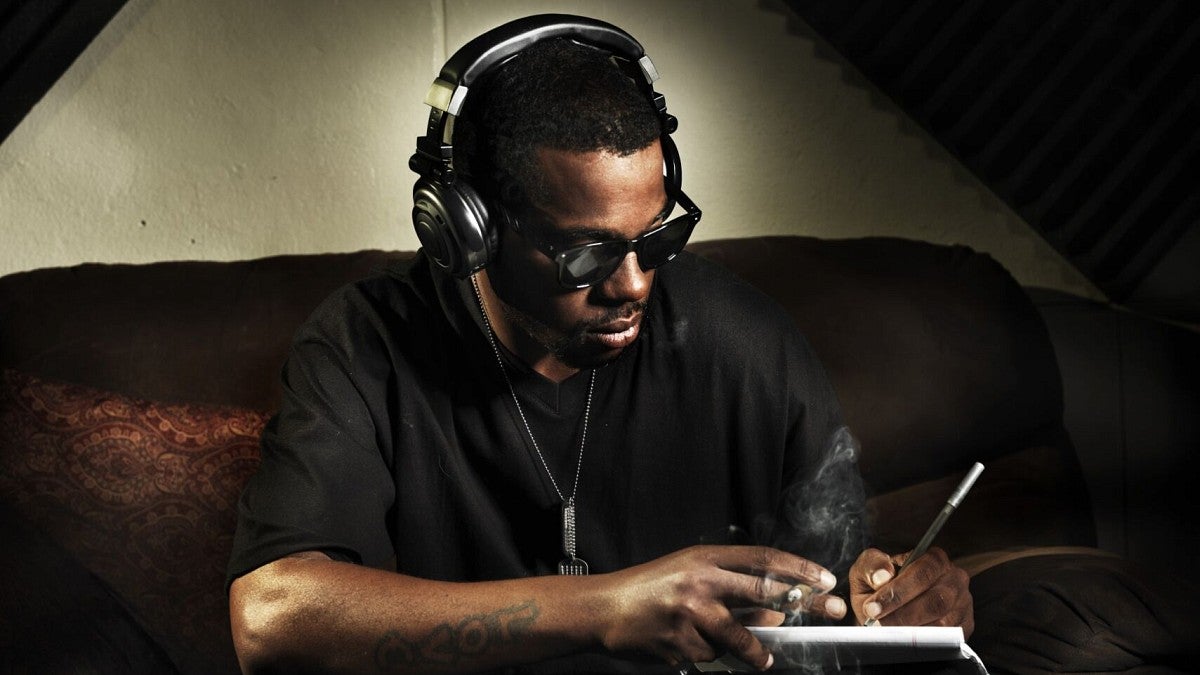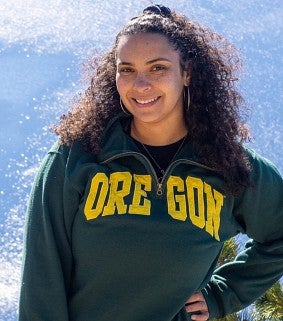
Experiential Learning | Research & Innovation | Community Impact | Career Preparation | Teaching Excellence | 21st Century Liberal Arts | Building Community | Good Vibes | CAS Spotlights | All Stories | Past Issues

January 8, 2024
How 50 Years of Hip Hop Have shaped the English Language: A Conversation with Rachel Weissler
It’s been 50 years since hip hop became a recognized genre in music. What started with the song “Rapper’s Delight” by the New Jersey-based group The Sugarhill Gang has grown into a cultural revolution that has spread throughout the US and the world, affecting everything from fashion to language.
Throughout 2023, fans across the globe celebrated the 50th anniversary of one of music’s most popular genres. In Eugene, faculty member André Sirois from the College of Arts and Sciences’ Department of Cinema Studies collaborated with the Hip Hop and the Politics of Race First-Year Interest Group to organize a 10-year anniversary show for the UO Hip Hop Jam.
The Nov. 30 concert featured local rappers, MCs, DJs, graffiti artists and B-boying (also called breakdancing). Acts such as Flock Rock, Rose Tinted, Savelle Tha Native and the Duck Street Dance Club offered a small overview of the rich diversity of arts that have emerged from the hip hop movement in the last 50 years.
But its impact extends far beyond art.

Rachel Weissler, a Black professor of linguistics who researches raciolinguistic emotion perception at the University of Oregon, shared her insights into the profound influence of hip hop on the English language, including the linguistic diversity within hip hop, conscious and unconscious language changes, and the appropriation of African-American English by different communities. CAS Connection spoke with Weissler to get her take on the contributions hip hop has made to the English language.
How does hip hop, as a genre, reflect the linguistic diversity within the Black community?
Language is ever-evolving, just like human life. Regardless of your race, people play with language all the time, and we are always making things new. Often it’s about the economy of language; we want to get to the point. We want to say things as succinctly as possible and as quickly as possible, so we’re often going to be making words smaller, more limited or easier to pronounce so it works for us in our daily communication.
In the context of hip hop, artists often bring their cultural identity into their rap, reflecting the linguistic diversity within the Black community. From Detroit to California, you can hear distinctive linguistic differences that showcase the beauty of language variation in our country.
Have you observed tangible linguistic developments in African-American English throughout your career, especially with the globalization of society through platforms like TikTok?
Absolutely. In our fast-paced, globalized society, language changes more rapidly than ever. Platforms like TikTok contribute to the swift dissemination of linguistic trends. We witness language changes happening in real time, often faster than we can document them.
For example, we may see white members of Gen Z using African-American English and especially older African-American English terms that the Black community has been using for a long time. Since we’re seeing people who are in the white majority using this language, it’s now being classified as “kid speak,” “teen speak” or “Gen Z speak” instead of being called what it is: African-American English.
Do you believe the Black community actively expands its lexicon as a conscious choice, or is it a natural byproduct of cultural dynamics?
Language change can be both conscious and unconscious.
Historically, Black communities have engaged in conscious language innovation, especially during periods like enslavement, where unique language was developed for resistance and community signaling. At that time, when you think about the resistance and rebellion, folks had to come up with terms and words to say to each other about escaping. They needed their words to be unique and in-group so that the white slave owners wouldn’t know their plans.
Today, language change often occurs unconsciously based on environmental influences. However, within the Black community, there's a conscious effort to innovate and maintain in-group communication through language. So even if people are taking from our variety, we’re going to continue innovating.
Black people are such innovators, especially when it comes to language.
How do you view the appropriation of African-American English by individuals outside the Black community, particularly in the realm of hip hop?
Appropriation is a complex issue. While language is meant to be shared, it becomes problematic when certain individuals, particularly white artists, appropriate African-American English without acknowledging its roots.
Authenticity in using language is crucial. Artists like Lil Dicky demonstrate an authentic engagement with their cultural background, avoiding appropriation while still participating in the hip hop genre.
How do you think the spread of hip hop, especially over the past 50 years, has contributed to the assimilation of linguistic traits from the Black community into mainstream culture, particularly among white people?
Hip hop has undeniably influenced mainstream culture and language. The globalization of hip hop has allowed linguistic elements from the Black community to permeate various cultural spheres.
However, it's essential to recognize the nuances of appropriation. White individuals adopting linguistic traits should be mindful of their role and impact, ensuring they don't perpetuate harmful stereotypes or undermine the authenticity of the Black community.
As we explore the evolution of language through the lens of hip hop, it is essential to recognize and respect the diverse linguistic contributions of the Black community for all that goes into language and its rapid developments while highlighting hip hop as one piece of the mosaic that is African-American culture.
—Codi Farmer (psychology, ’24) is a communications assistant for the College of Arts and Sciences.
Author’s note: As a white woman who grew up in both Southern California and Texas, I acknowledge that I do not have the background to write about this topic with definitive certainty.
